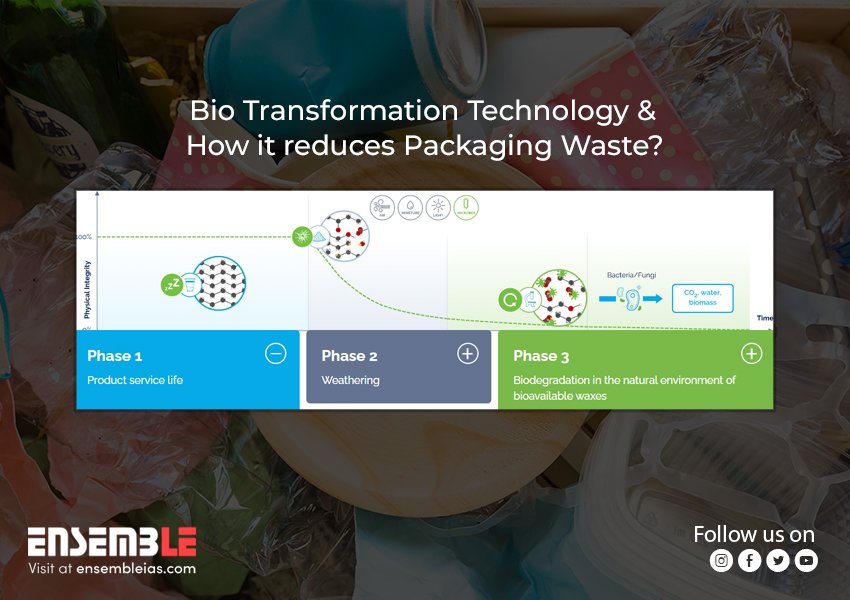Why is it making Headlines?
In a recent report published in one of the major leading dailies, a report was published in which it was stated that a UK-based startup, based at Imperial College in London, claims to have developed this technology that could alter the state of plastic and make them biodegradable.
Understanding the Need for the Technology
Plastic and Packaging Waste across the globe is one of the major challenges that we face today and as the world grapples with this continuous problem, there is a need to adopt new innovative technological solutions to counter this.
Bio Transformation Technology, over the last few years, has emerged as a major solution for reducing Packaging Waste. This technology involves the use of biological organisms to break down and transform waste materials into the products that are useful, eventually reducing the amount of waste that ends up in landfills or reaches our water bodies like rivers, seas and oceans.
Let’s dive into what Bio Transformation Technology is all about and how it can be a game changer in reducing Packaging Waste in India.
What is Bio Transformation Technology and how does it Functions?
Bio transformation technology is a process that involves the use of microorganisms such as bacteria, fungi, and enzymes to break down organic matter into simpler compounds.
This process is known as biodegradation, and as we all have studied in our EVS Textbooks, it also occurs naturally in the environment. However, bio transformation technology uses specially selected microorganisms to accelerate the entire process and make it more efficient and effective.
If one closely dives deeply into the entire process, they would come to a conclusion that there are numerous benefits of bio transformation technology. First, it is a sustainable solution to the problem of waste management.
Why is it Eco-Friendly and a perfect fit to India’s Vision of promoting Sustainability?
Unlike traditional waste disposal methods such as incineration or landfill, bio transformation technology does not produce harmful by-products such as greenhouse gases or toxic chemicals that cause Air Pollution. Instead, it produces useful products such as compost, biofuels, and bioplastics. As per a study, Food Packaging, Healthcare and E-commerce are few sectors that are reported to have been significant contributors of Plastic and Packaging Waste across India. This is where the Bio transformation technology comes in can help reduce the amount of packaging waste generated by the food and beverage industry.
What are its Benefits?
Bio transformation technology can help reduce this packaging waste by providing an alternative to traditional plastic packaging. Bioplastics, for example, are made from renewable resources such as corn starch, sugarcane, or potato starch. They are biodegradable and compostable, which means they can be broken down by microorganisms in the environment. This makes them a much more sustainable option than traditional plastic packaging.
Moreover, the bio transformation technology can also help reduce the carbon footprint of the food and beverage industry. This is because many bio transformation technologies produce biofuels, which can be used to power vehicles or generate electricity. Biofuels are made from organic matter such as waste cooking oil or agricultural residues. They are renewable, carbon-neutral, and produce fewer emissions than fossil fuels.
Sectors where Bio Transformation Technology can be a game changer
Bio transformation technology can be implemented in various sectors across India to address the growing waste management challenges faced by the country. One promising area is the agricultural sector, where organic waste generated from crops, animal husbandry, and food processing can be transformed into valuable products like biofuels, biogas, and compost using this technology. Similarly, urban areas can benefit from the implementation of bio transformation technology, where it can be used to manage municipal solid waste, food waste, and sewage sludge. The technology can also be applied in the industrial sector to manage various organic waste streams generated by industries such as paper and pulp, pharmaceuticals, and textiles. By implementing bio transformation technology, India can reduce its environmental footprint, promote sustainable practices, and generate economic benefits by producing valuable products from waste materials.
How can Bio Transformation Technology be implemented in India to reduce packaging waste?
One way to promote the use of biodegradable and compostable packaging materials in the food and beverage industry is through government incentives, such as tax breaks or subsidies, to companies that switch to biodegradable packaging.
The government can also mandate the use of biodegradable packaging for certain products, such as single-use plastics.
Another way is to encourage the development of bio transformation technology startups in India. These startups can work on developing new and innovative solutions for waste management, such as new biodegradable packaging materials or more efficient biofuels. The government can provide funding and support for these startups, as well as creating a regulatory framework to promote their growth.
Summing it up, Bio Transformation Technology is a promising solution to the problem of plastic waste in India. By using biological organisms to break down waste materials, it can reduce the amount of waste that ends up in landfills or oceans, and provide useful products such as compost, biofuels, and bioplastics. By promoting the use of biodegradable packaging materials, encouraging the development of startups in the bio transformation sector, and investing in research and development, we, as a Nation, could significantly reduce Packaging and Plastic Waste and could do our bit in saving the environment and ensuring a Greener and a Bluer Earth.





